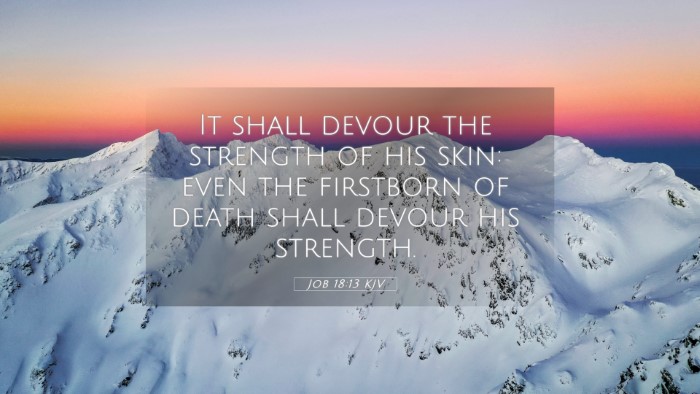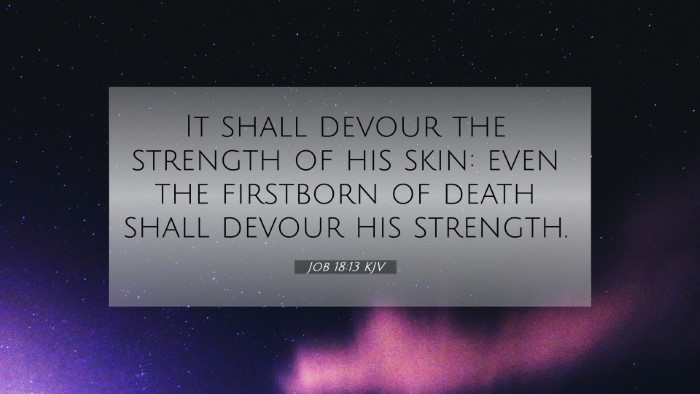Old Testament
Genesis Exodus Leviticus Numbers Deuteronomy Joshua Judges Ruth 1 Samuel 2 Samuel 1 Kings 2 Kings 1 Chronicles 2 Chronicles Ezra Nehemiah Esther Job Psalms Proverbs Ecclesiastes Song of Solomon Isaiah Jeremiah Lamentations Ezekiel Daniel Hosea Joel Amos Obadiah Jonah Micah Nahum Habakkuk Zephaniah Haggai Zechariah MalachiJob 18:13 Similar Verses
Job 18:13 Cross References
It shall devour the strength of his skin: even the firstborn of death shall devour his strength.
Uncover the Rich Themes and Topics of This Bible Verse
Listed below are the Bible themes associated with Job 18:13. We invite you to explore each theme to gain deeper insights into the Scriptures.
Job 18:13 Cross Reference Verses
This section features a detailed cross-reference designed to enrich your understanding of the Scriptures. Below, you will find carefully selected verses that echo the themes and teachings related to Job 18:13 KJV. Click on any image to explore detailed analyses of related Bible verses and uncover deeper theological insights.
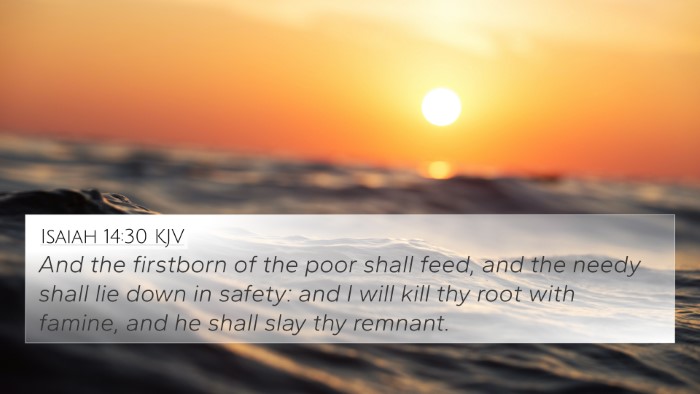
Isaiah 14:30 (KJV) »
And the firstborn of the poor shall feed, and the needy shall lie down in safety: and I will kill thy root with famine, and he shall slay thy remnant.

Genesis 49:3 (KJV) »
Reuben, thou art my firstborn, my might, and the beginning of my strength, the excellency of dignity, and the excellency of power:

Jonah 2:6 (KJV) »
I went down to the bottoms of the mountains; the earth with her bars was about me for ever: yet hast thou brought up my life from corruption, O LORD my God.
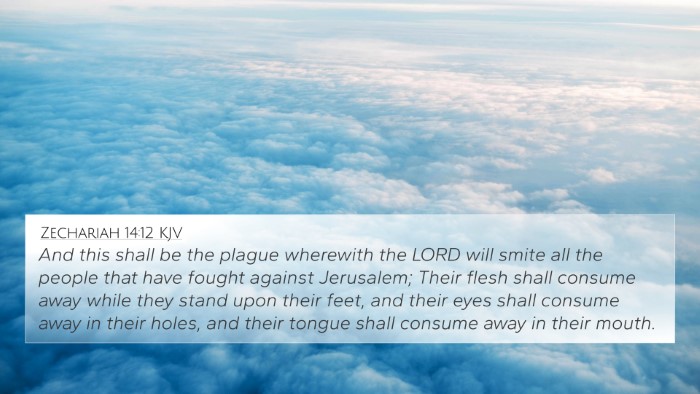
Zechariah 14:12 (KJV) »
And this shall be the plague wherewith the LORD will smite all the people that have fought against Jerusalem; Their flesh shall consume away while they stand upon their feet, and their eyes shall consume away in their holes, and their tongue shall consume away in their mouth.
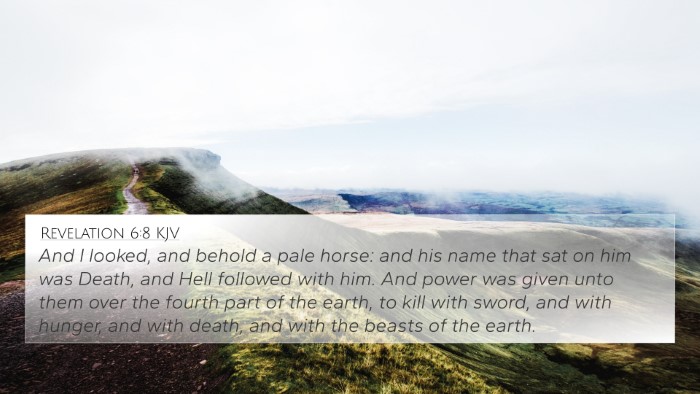
Revelation 6:8 (KJV) »
And I looked, and behold a pale horse: and his name that sat on him was Death, and Hell followed with him. And power was given unto them over the fourth part of the earth, to kill with sword, and with hunger, and with death, and with the beasts of the earth.
Job 18:13 Verse Analysis and Similar Verses
Understanding Job 18:13
Job 18:13 states, "It consumes the parts of his skin; the firstborn of death consumes his parts." This verse portrays the severity of suffering and the relentless nature of death's grasp over humanity.
Verse Context and Overview
In the context of the book of Job, this verse occurs during Bildad's speech, where he articulates his understanding of divine justice. The idea of suffering, particularly in the life of Job, is central to this passage.
Significant Themes
- Suffering: The reference to death and suffering reflects the overarching theme of human pain and God's sovereignty.
- Death's Grip: The representation of death consuming parts of Job illustrates both physical and existential dread.
- Divine Justice: Bildad’s comments suggest a retributive view of God's justice, indicating that suffering is often a consequence of sin.
Insights from Public Domain Commentaries
Matthew Henry's Commentary
Matthew Henry emphasizes that Bildad's words serve as a warning of the destructive power of sin. He interprets "the firstborn of death" as a metaphor for the overwhelming nature of death that affects humans on multiple levels—spiritually, physically, and relationally. Henry suggests that this encapsulates the despair that surrounds those who are undergoing immense suffering.
Albert Barnes' Note
Albert Barnes adds that this passage highlights the consequences of a life turned away from God. He points out that Bildad’s speech portrays a view in which calamity is directly linked to personal wrongdoing, suggesting that such suffering serves a purpose in bringing the afflicted to repentance. The consuming nature of death is emblematic of the totality of judgment that the unrepentant face.
Adam Clarke's Commentary
Adam Clarke remarks on the metaphorical significance of "the firstborn of death." He argues that this phrase indicates both the inevitability of death and its role as a precursor to final judgment. Clarke stresses that rather than merely physical death, this encompasses a deeper spiritual death—a separation from life itself. His insights suggest a deeper existential reflection on the human condition in light of divine scrutiny.
Cross-References to Job 18:13
This verse finds resonance across various scripture passages. Here are some relevant cross-references:
- Psalm 49:14 - "Like sheep they are laid in the grave; death shall feed on them."
- Isaiah 28:15 - "Because you have said, 'We have made a covenant with death and with Sheol we are in agreement.'
- Ecclesiastes 12:7 - "Then the dust will return to the earth, and the spirit will return to God who gave it."
- Hebrews 9:27 - "And just as it is appointed for man to die once, and after that comes judgment."
- Revelation 20:14 - "Then Death and Hades were thrown into the lake of fire."
- Romans 6:23 - "For the wages of sin is death, but the free gift of God is eternal life in Christ Jesus our Lord."
- 1 Corinthians 15:26 - "The last enemy to be destroyed is death."
Applications and Reflections
Reflecting on Job 18:13 fosters a deeper understanding of suffering through a theological lens. It encourages believers to consider how life's trials might relate to cosmic justice and personal faith. The associated cross-references depict a broader narrative of hope and redemption in the face of death’s certainty.
Thematic Connections
Various Bible verses connect through the themes of suffering and divine justice. Conducting comparative Bible verse analysis can enhance comprehension of these struggles throughout scripture. For instance, linking Job’s anguish with the lamentations found in Psalms reveals a relatable human experience before God during times of trouble.
Tools for Cross-Referencing
For deeper study, utilizing tools for Bible cross-referencing such as a Bible concordance or a cross-reference Bible study guide can illuminate the connections between different passages. Understanding these links can significantly enhance scriptural interpretation.
Conclusion
In conclusion, Job 18:13 stands as a potent reminder of the complexities of suffering, the certainty of death, and the hope found in God’s eventual justice. By engaging with this verse through public domain commentaries and relevant cross-references, one gains a richer understanding of God's Word and its applications to life’s tribulations.

